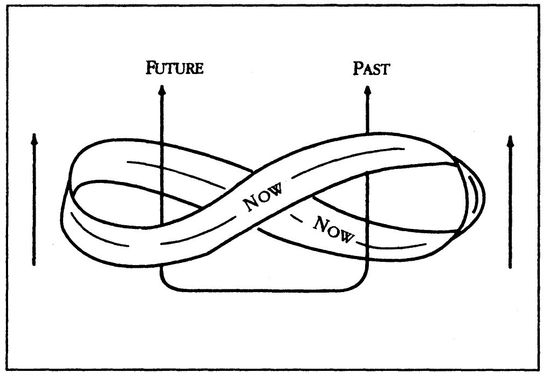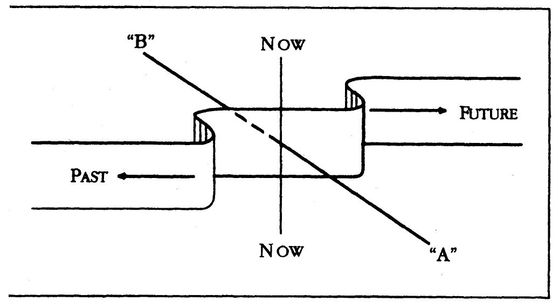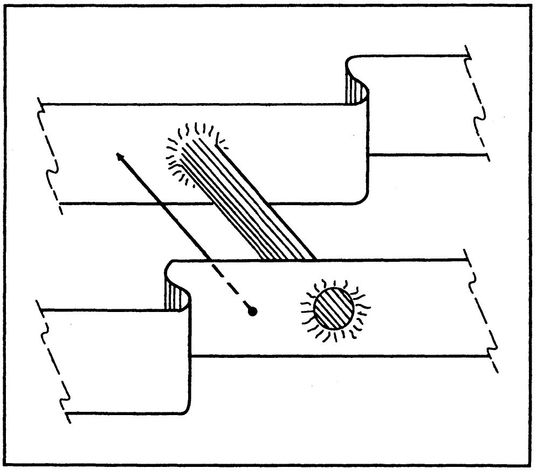The Source (30 page)
Authors: Brian Lumley

“That was my line of reasoning, too.” Harry admitted, “âuntil recently. But you and me, why, don't we both contradict that very fact?”
“Eh? How's that?”
“The Möbius Continuum,” Harry answered, by way of explanation. “You yourself admit that it's a purely metaphysical plane, not of this universe. Step into the Mobius Continuum and you step out of the three mundane dimensions. The Mobius Continuum not only transcends the three dimensions of mundane space but time also, and runs parallel to all of them! And what of a black hole?”
“What of it?” (Möbius's mental shrug).
“Well, isn't a black hole an exit from this universe? That's how they've always been explained to me: a focus of gravity so great that space and time themselves are drawn into the whorl. And if they
are
exits from the here and now,
then where the hell do they lead?”
are
exits from the here and now,
then where the hell do they lead?”
“To another part of the universe,” Möbius answered. “That seems the only likely explanation to me. Mind you, I haven't really looked at black holes yet. I have them scheduled, though.”
“Are you missing the point or deliberately avoiding it?” Harry wanted to know. “This is my question: if a black hole goes somewhere, emerging maybe light-years away, what of the space in between? Where is the material which is drawn into the hole, between its disappearing and its reappearing? You see, to me this all seems very much like our Möbius Continuum.”
“Go on,” Möbius was fascinated.
“OK,” said Harry, “let's look at it this way. First we have the ⦠let's call it the mundane universe. And we'll say it looks like this.”
He showed Möbius a mental diagram.

“Why the bends?” the mathematician was immediately curious.
“Because without them it would just be a pair of straight lines,” Harry told him. “The bends give it definition, make it look like something.”
“Like a ribbon?”
“For the purpose of the exercise, why not? For all I know it could be a circle, or maybe a sphere. But this way we can envisage a past and a future, too.”
“Very well,” Möbius conceded.
“Now in this diagram of the universe,” Harry went on, “we can't go from âA' to âB' without crossing the edge. We can go up the ribbon from âA' to the edge, then down to âB.' Or down to the edge and up, it makes no difference. The edge represents the distance between âA' and âB,' right?”
“Agreed,” said the other.
“Now this is how I see the Möbius Continuum,” said Harry:

And he continued: “It's the ribbon universe we know with the half-twist of your Möbius strip. âNow' has turned through ninety degrees to become âforever.' Which means that âA' and âB' are now on the same
plane. We no longer have to cross the edge. We can go from one to the other instantaneouslyâânow!'”
plane. We no longer have to cross the edge. We can go from one to the other instantaneouslyâânow!'”
“Go on,” said Möbius again, but much more thoughtfully.
“Previously we've thought of it like this:” said Harry. “Like ⦠like putting on a pair of seven-league boots and striding to our destinations in seconds. Covering distances that should take hours in minutes. But I've checked it out and it's not like that. In fact we go there
instantaneously
âaccordingly to Earth-time, anyway. It's not simply that we go there faster, but that the space in between actually disappears!”
instantaneously
âaccordingly to Earth-time, anyway. It's not simply that we go there faster, but that the space in between actually disappears!”
After a while Möbius said, “I think I understand. What you want to know is this: if for us the space between âA' and âB' reduces to zeroâif it disappearsâ”
“Exactly!” Harry cut in.
“Where does it go to?”
“Where does it go to?”
“But it's an illusion” Mobius cried. “It's still there. It's we who have disappearedâinto the Möbius Continuum, as you insist upon calling it!”
“Now we're getting somewhere,” Harry took a deep breath. “You see, the way I see it, the Möbius Continuum is no-man's-land, it's limbo, it's the middle ground
between
universes. âUniverses'âplural! It has doors to the past, the future, and to every point in present time. Using it, we can go everywhere and -whenâor at least I can, because I still have a life-thread to follow. But the point I'm trying to make is this: I believe there may be other doors which we haven't found yet. We don't have the equations for them. And I believe that one of those doors, when I find it, willâ”
between
universes. âUniverses'âplural! It has doors to the past, the future, and to every point in present time. Using it, we can go everywhere and -whenâor at least I can, because I still have a life-thread to follow. But the point I'm trying to make is this: I believe there may be other doors which we haven't found yet. We don't have the equations for them. And I believe that one of those doors, when I find it, willâ”
“âLead you to your wife and son, and to Michael J. Simmons?”
“Yes!”
Möbius nodded (in his fashion) and gave it some thought. “Other doors,” he mused. Then: “Grant me thisâthat I know more about the Möbius dimension than you do. That I have had one hundred and twenty
years to examine it more thoroughly than you could ever hope to. That I
discovered
it, and have used it to go places you can never go, not in your lifetime.”
years to examine it more thoroughly than you could ever hope to. That I
discovered
it, and have used it to go places you can never go, not in your lifetime.”
“Oh?” said Harry.
“Oh?” Möbius raised his eyebrows again.
“Oh?
And can you go to the centre of a star in Betelgeuse to measure its temperature? Can you visit the moons of Jupiter or sit in the middle of that planet's monumental tornado which we call the Red Spot? Can you journey to the bottom of the Marianas Trench and every other deep on Earth to calculate the mass of water in this world? No, you can't. But I canâand have! Now grant me this: that I know the Möbius Continuum better than you do!”
“Oh?
And can you go to the centre of a star in Betelgeuse to measure its temperature? Can you visit the moons of Jupiter or sit in the middle of that planet's monumental tornado which we call the Red Spot? Can you journey to the bottom of the Marianas Trench and every other deep on Earth to calculate the mass of water in this world? No, you can't. But I canâand have! Now grant me this: that I know the Möbius Continuum better than you do!”
When the point was made like that, there seemed little use in arguing it. Harry could only agree, but: “I think you're going to tell me something I don't want to hear,” he said.
“You know I am!” Möbius told him. “There are no other doors we haven't discovered, Harry. Not in the Möbius Continuum. Other universes?âwhich seems to me something of a contradiction in itselfâI can't say. And in any case you're talking to the wrong man, for I only deal in the three-dimensional worlds we know. But of one thing I'm sure: you won't find your way into any parallel world through the Möbius Continuum ⦔ He fell silent as Harry's disappointment swelled like a physical thing, until it hung heavy over Möbius's grave like a blanket of fog.
“Sir,” Harry finally said, “I thank you for your time; I've already wasted far too much of it.”
“Not at all,” Mobius answered. “Time is only important to the living. I have more than enough of time! I just wish I was able to help.”
“You've helped,” Harry was grateful, “if only to settle a point I've argued with myself time and time again. You see, I know Harry Jr. and his mother are alive, and I know that he can use the Möbius Continuum
maybe even better than we can. He's alive but not in this universe, so he must be in some other. There's no way round that. I thought he'd gone there, wherever, along the strip. You've assured me that he hasn't. So ⦠there has to be some other route. I already have a clue where to start looking for it, except ⦠from here on in my work becomes that much more dangerous, that's all. And nowâ”
maybe even better than we can. He's alive but not in this universe, so he must be in some other. There's no way round that. I thought he'd gone there, wherever, along the strip. You've assured me that he hasn't. So ⦠there has to be some other route. I already have a clue where to start looking for it, except ⦠from here on in my work becomes that much more dangerous, that's all. And nowâ”
“Wait!” said Möbius. “I've been considering your diagrams. Can I show you one for a change?”
“By all means.”
“Very well: here's your ribbon universe againâ
and
a parallel universe of a similar construction:”
and
a parallel universe of a similar construction:”

“As you can see, Möbius continued,”I've joined them by use ofâ”
“A black hole?” Harry guessed.
“No, for we're talking about survivability. Nothing of solid matter and shape can enter that sort of awful maw and retain any sort of integrity. No matter what you are when you enter a black hole, you come outâ
if
you come outâgaseous, atomic, pure energy!”
if
you come outâgaseous, atomic, pure energy!”
“Which cancels out white holes, too.” Harry was growing gloomier by the minute.
“But not grey ones,” said Möbius.
“Grey holes?” Harry frowned.
“ ⦠Yes, I see it now,” Möbius mused, almost to himself. “Grey holes, without the disruptive gravity of black holes. Gateways pure and simple, between universes. Entropy radiators, perhaps? Inescapable once entered into, there would have to be more than oneâif a traveller intended to make the return journey, anyway ⦔
Harry waited, and in a little while weird equations began flickering once more on that amazing computer screen which Möbius called his mind. They came faster and faster, calculi in endless streams, which left Harry dizzy as he tried to grasp their meaning. For seconds merging into minutes the mental display continuedâonly to be shut off, suddenly, leaving the screen blank. And in a little while longer
“It is ⦠possible,” said Möbius. “It could occur in nature, and might even be duplicated by man. Except of course that men would have no use for it. It would be a by-product of some other experimentation, an accident.”
“But if I knew howâif I could translate your math into engineeringâyou're saying I could manufacture this, well, gateway?” Harry was clutching at straws.
“You? Hardly!” Möbius chuckled. “But a team of scientists, with enormous resources and a limitless energy supplyâyes!”
Harry thought of the experiments at Perchorsk, and his excitement was now obvious. “That's the confirmation
I needed,” he said. “And now I have to be on my way.”
I needed,” he said. “And now I have to be on my way.”
“It was good to talk to you again,” Möbius told him. “Take care, Harry.”
“I will,” Harry promised. And hugging his overcoat close to him (or if not “his” overcoat, one which he'd borrowed from Jazz Simmons's wardrobe) Harry conjured a Möbius door and took his departure.
Leaves blew skitteringly between the graves and along the pathways. One such leaf, taken by surprise as it leaned against Harry's shoe, suddenly went tumbling across the empty flags where a moment ago he'd been standing. But now, under the high-flying moon and cold, glittering stars, the Leipzig graveyard was quite, quite empty â¦
Â
Some three days prior to (and an entire dimension away from) Harry's visit to Möbius:
Jazz Simmons journeyed west with Zek, Lardis and his Travellers, journeyed in the golden glow of the slowly setting sun. He'd been pleased to be relieved of his kit, all except his gun and two full magazines, and knew that even though he was dog-tired he could now hold out until the Travellers made camp.
Other books
Rama the Gypsy Cat by Betsy Byars
Los cuadros del anatomista by Alejandro Arís
When Love Hurts and Ghosts Linger by Rachel
The Reluctant Twitcher by Richard Pope
The Last One by Tawdra Kandle
Her Scales Shine Like Music by Rajnar Vajra
The Wedding of Anna F. by Mylene Dressler
Showdown by Edward Gorman / Ed Gorman
Code Name: Kayla's Fire by Natasza Waters
Hard Core (Onyx Group) by Jennifer Lowery
